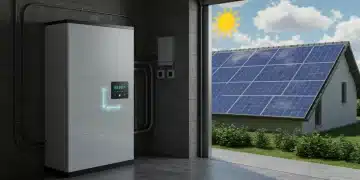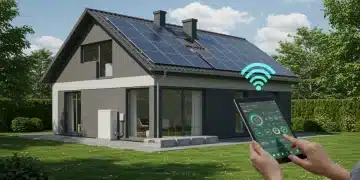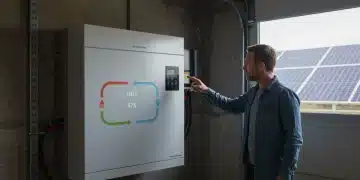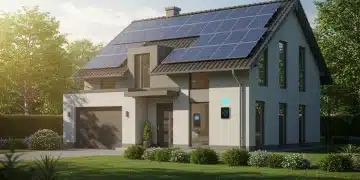Unlock the Benefits of Renewable Energy Sources in Your Home

Using renewable energy sources in your home offers numerous benefits, including reduced energy costs, a smaller carbon footprint, increased home value, and greater energy independence, contributing to a more sustainable lifestyle.
Thinking about making your home greener and more energy-efficient? Exploring the benefits of using renewable energy sources in your home can be a game-changer. Discover how you can save money, help the planet, and increase your home’s value all at once.
Harnessing the Power of Nature: An Introduction to Home Renewable Energy
Renewable energy is becoming increasingly popular as homeowners look for ways to reduce their environmental impact and lower their utility bills. By tapping into sources like solar, wind, and geothermal, you can power your home in a sustainable and cost-effective way.
This section will explore the basics of renewable energy sources suitable for residential use, setting the stage for understanding their specific benefits.
Understanding Renewable Energy Options
Renewable energy sources are naturally replenishing and produce little to no pollution. Here are a few common options for your home:
- Solar Power: Converts sunlight into electricity using photovoltaic (PV) panels. Ideal for sunny locations.
- Wind Power: Uses wind turbines to generate electricity. Best suited for areas with consistent wind.
- Geothermal Energy: Taps into the Earth’s internal heat for heating and cooling. Requires a geothermal heat pump system.
Choosing the right renewable energy source depends on your location, climate, and energy needs. Understanding each option’s potential helps you make an informed decision.
In conclusion, understanding the available renewable energy sources is the first step in leveraging their potential benefits for your home and the environment.
Cut Utility Bills: The Long-Term Cost Savings of Renewable Energy
One of the most compelling reasons to switch to renewable energy is the potential for significant cost savings. While the initial investment can be substantial, the long-term financial benefits often outweigh the upfront expenses.
Let’s delve into how renewable energy can help you save money on your utility bills over time.

Reducing Your Carbon Footprint
Renewable energy systems can drastically reduce or even eliminate your reliance on traditional fossil fuels. This translates directly into lower monthly utility bills.
For example, solar panel systems can offset a significant portion of your electricity consumption, resulting in net metering credits from your utility company.
Government Incentives and Rebates
Many federal, state, and local governments offer incentives, rebates, and tax credits to encourage the adoption of renewable energy. These programs can significantly reduce the initial cost of installing renewable energy systems.
- Federal Tax Credits: The federal government offers tax credits for solar, wind, and geothermal systems.
- State Rebates: Many states provide additional rebates for installing renewable energy systems.
- Local Incentives: Some cities and counties offer incentives such as property tax exemptions or grants.
Taking advantage of these incentives can make renewable energy more affordable.
In conclusion, the long-term cost savings and available incentives make renewable energy a financially sound investment for homeowners.
Going Green: How Renewable Energy Benefits the Environment
Beyond the financial benefits, renewable energy offers significant environmental advantages. Reducing your reliance on fossil fuels helps to decrease greenhouse gas emissions and combat climate change.
This section will explore the positive impact that renewable energy sources have on the environment.
Reducing Greenhouse Gas Emissions
Fossil fuels like coal, oil, and natural gas release harmful greenhouse gases into the atmosphere when burned for energy. Renewable energy sources, on the other hand, produce little to no emissions during operation.
By switching to renewable energy, you can reduce your carbon footprint and help to mitigate climate change.
Conserving Natural Resources
Traditional energy sources often require the extraction and transportation of finite natural resources, which can have detrimental effects on the environment. Renewable energy relies on resources that are naturally replenished, such as sunlight, wind, and geothermal heat.
Improving Air and Water Quality
Fossil fuel combustion can lead to air and water pollution, which can harm human health and ecosystems. Renewable energy sources produce clean energy with minimal pollution.
- Cleaner Air: Reduces respiratory illnesses and improves air quality.
- Cleaner Water: Prevents water contamination from fossil fuel extraction and processing.
- Less Environmental Damage: Minimizes habitat destruction and ecosystem degradation.
Overall, using renewable energy contributes to a healthier environment for current and future generations.
In conclusion, renewable energy plays a crucial role in protecting our environment and fostering a sustainable future.
Boosting Home Value: The Market Appeal of Energy-Efficient Homes
Investing in renewable energy can increase the value of your home and make it more attractive to potential buyers. Energy-efficient homes are becoming increasingly desirable in today’s market.
Let’s examine how renewable energy systems can enhance your home’s market appeal and resale value.
Increased Property Value
Homes with renewable energy systems often command higher prices than comparable homes without them. Buyers are willing to pay more for homes that offer lower utility bills and environmental benefits.
Studies have shown that solar panels, for example, can increase a home’s resale value by several thousand dollars.
Attracting Eco-Conscious Buyers
As awareness of environmental issues grows, more buyers are seeking homes with sustainable features. Renewable energy systems can be a major selling point for eco-conscious buyers.

Energy Efficiency Ratings
Homes with renewable energy systems often receive higher energy efficiency ratings, such as those from the Energy Star program. These ratings can be used to market your home to buyers.
- Energy Star Certification: Indicates that your home meets strict energy efficiency standards.
- Home Energy Score: Provides a numerical rating of your home’s energy performance.
- Green Building Certifications: Certifications like LEED recognize homes built with sustainable practices.
Highlighting your home’s energy efficiency can attract more buyers and fetch a higher price.
In conclusion, investing in renewable energy not only benefits you financially and environmentally but also increases the value and market appeal of your home.
Energy Independence: Reducing Reliance on the Grid
Another significant advantage of renewable energy is the increased energy independence it provides. By generating your own power, you can reduce your reliance on the traditional electric grid.
This section will explain how renewable energy can help you achieve greater energy autonomy.
Generating Your Own Power
Renewable energy systems allow you to generate your own electricity, reducing your dependence on utility companies. This can be particularly beneficial during power outages or emergencies.
Solar panels, for example, can continue to generate electricity even when the grid is down, if you have a battery storage system.
Net Metering Programs
Many utility companies offer net metering programs, which allow you to sell excess electricity back to the grid. This can further reduce your energy costs and increase your energy independence.
Battery Storage Solutions
Battery storage systems can store excess energy generated by renewable sources, allowing you to use it when needed. This can provide a reliable source of power during peak demand periods or power outages.
- Backup Power: Provides electricity during grid outages.
- Peak Shaving: Reduces energy consumption during peak demand periods.
- Energy Security: Ensures a reliable energy supply.
Investing in battery storage can enhance your energy independence and security.
In conclusion, renewable energy empowers you to take control of your energy supply and reduce your reliance on the grid.
Enhancing Home Comfort: Geothermal Heating and Cooling
Geothermal energy offers a unique way to heat and cool your home using the Earth’s natural thermal energy. Geothermal heat pumps can provide consistent and efficient temperature control year-round.
This section will explore the benefits of geothermal heating and cooling systems for home comfort.
Consistent Temperature Control
Geothermal heat pumps maintain a more consistent temperature than traditional HVAC systems. They transfer heat to and from the Earth, which maintains a relatively constant temperature throughout the year.
Energy Efficiency
Geothermal systems are highly energy efficient, using up to 50% less energy than conventional heating and cooling systems. This can result in significant savings on your utility bills.
Quiet Operation
Geothermal heat pumps operate much more quietly than traditional air conditioners and furnaces. The indoor unit is typically very quiet, and the outdoor unit is located underground.
- Reduced Noise Pollution: Creates a quieter and more comfortable living environment.
- Improved Air Quality: Reduces allergens and pollutants in your home.
- Long Lifespan: Geothermal systems can last for 20 years or more.
Investing in a geothermal system can enhance your home comfort and improve your indoor environment.
In conclusion, geothermal energy offers a unique and efficient way to enhance home comfort and reduce energy consumption.
| Key Benefit | Brief Description |
|---|---|
| 💰 Cost Savings | Lower utility bills and potential income from selling excess energy. |
| 🌱 Environmental Impact | Reduced carbon footprint and contribution to a sustainable future. |
| 📈 Home Value | Increased property value and appeal to eco-conscious buyers. |
| ⚡ Energy Independence | Less reliance on the grid and greater control over energy supply. |
Frequently Asked Questions
▼
The most common renewable energy sources include solar power using photovoltaic (PV) panels, wind power via small turbines, and geothermal energy harnessed with geothermal heat pumps for heating and cooling.
▼
Savings vary depending on the renewable energy system and energy consumption, but many homeowners see reductions of 50% or more on their energy bills, particularly with solar or geothermal systems.
▼
Yes, there are several government incentives, including federal tax credits for solar, wind, and geothermal systems, as well as state rebates and local incentives to help offset installation costs.
▼
Renewable energy significantly reduces greenhouse gas emissions, conserves natural resources, and improves air and water quality by producing clean energy with minimal to no pollution during operation.
▼
Yes, homes with renewable energy systems often have higher property values and are more attractive to eco-conscious buyers, who are willing to pay more for energy-efficient and sustainable features.
Conclusion
Embracing renewable energy sources in your home is more than just a trend; it’s a smart move towards a sustainable and cost-effective future. From reducing your carbon footprint to boosting your home’s value and achieving energy independence, the benefits are clear. By investing in renewable energy, you’re not only improving your own life but also contributing to a healthier planet for generations to come.





